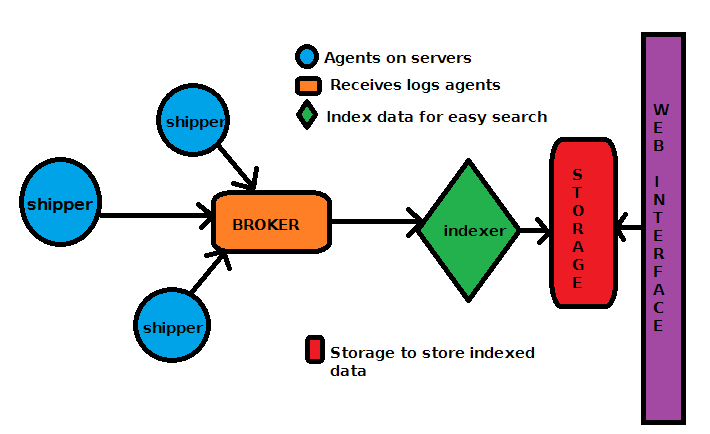Build NGINX 1.10.3 from package sources with added Naxsi, PageSpeed, LDAP and GeoIP on Ubuntu-16.04 Xenial
The Nginx packages in Ubuntu Xenial do not come with some modules that are one of the most important when setting up Nginx for production use, like LDAP, Naxsi WAF and Pagespeed, just to mention some that I most frequently need and use. This is the process I go through to get these modules into DEB packages.
Build and Install
The work is being done on an AWS EC2 instance with Xenial installed:
# lsb_release -a
No LSB modules are available.
Distributor ID: Ubuntu
Description: Ubuntu 16.04.3 LTS
Release: 16.04
Codename: xenial
The current version of Nginx in Xenial is 1.10.3 so I start by downloading the source for it.
cd /tmp
sudo apt build-dep nginx-extras nginx-common
sudo apt-get source nginx-extras
cd nginx-1.10.3/
Install some needed packages:
sudo apt install liblua5.1-0-dev libluajit-5.1-dev daemon dbconfig-common unzip
First I make sure I have the needed modules enabled in nginx-1.10.3/auto/options, change HTTP_GEOIP=NO to HTTP_GEOIP=YES and enable some other modules like DAV, SSL, SUB, XSLT etc. And then pulling in the needed modules like the LDAP one:
cd debian/modules/
git clone https://github.com/kvspb/nginx-auth-ldap.git
then Pagespeed with PSOL:
wget https://github.com/pagespeed/ngx_pagespeed/archive/latest-stable.zip
unzip latest-stable.zip
cd ngx_pagespeed-latest-stable/
wget https://dl.google.com/dl/page-speed/psol/1.12.34.2-x64.tar.gz
tar -xzvf 1.12.34.2-x64.tar.gz
rm 1.12.34.2-x64.tar.gz
and NAXSI too:
cd /tmp
unzip master.zip
cp -R naxsi-master/naxsi_src/ nginx-1.10.3/debian/modules/nginx-naxsi
Then I edit the nginx-1.10.3/debian/rules file and add the new modules to the appropriate section:
[...]
extras_configure_flags := \
$(common_configure_flags) \
--with-http_addition_module \
--with-http_dav_module \
[...]
--add-module=$(MODULESDIR)/nginx-lua \
--add-module=$(MODULESDIR)/nginx-upload-progress \
--add-module=$(MODULESDIR)/nginx-upstream-fair \
--add-module=$(MODULESDIR)/ngx_http_substitutions_filter_module \
--add-module=$(MODULESDIR)/nginx-auth-ldap \
--add-module=$(MODULESDIR)/ngx_pagespeed-latest-stable \
--add-module=$(MODULESDIR)/nginx-naxsi
[...]
Basically add:
--add-module=$(MODULESDIR)/nginx-auth-ldap \
--add-module=$(MODULESDIR)/ngx_pagespeed-latest-stable \
--add-module=$(MODULESDIR)/nginx-naxsi
to all sections for the nginx variants we want to include the modules for. Next is the nginx-1.10.3/debian/changelog file. Substitute the first line at the top:
nginx (1.10.3-0ubuntu0.16.04.2) xenial-security; urgency=medium
with:
nginx (1.10.3-0ubuntu0.16.04.2-ldap-pagespeed-naxsi) xenial-security; urgency=medium
Change into the nginx-1.10.3 directory and build the deb packages:
sudo dpkg-buildpackage -uc -b
and install what we need:
$ cd ../
$ ls -1 nginx*naxsi*.deb
nginx_1.10.3-0ubuntu0.16.04.2-ldap-pagespeed-naxsi_all.deb
nginx-common_1.10.3-0ubuntu0.16.04.2-ldap-pagespeed-naxsi_all.deb
nginx-core_1.10.3-0ubuntu0.16.04.2-ldap-pagespeed-naxsi_amd64.deb
nginx-core-dbg_1.10.3-0ubuntu0.16.04.2-ldap-pagespeed-naxsi_amd64.deb
nginx-doc_1.10.3-0ubuntu0.16.04.2-ldap-pagespeed-naxsi_all.deb
nginx-extras_1.10.3-0ubuntu0.16.04.2-ldap-pagespeed-naxsi_amd64.deb
nginx-extras-dbg_1.10.3-0ubuntu0.16.04.2-ldap-pagespeed-naxsi_amd64.deb
nginx-full_1.10.3-0ubuntu0.16.04.2-ldap-pagespeed-naxsi_amd64.deb
nginx-full-dbg_1.10.3-0ubuntu0.16.04.2-ldap-pagespeed-naxsi_amd64.deb
nginx-light_1.10.3-0ubuntu0.16.04.2-ldap-pagespeed-naxsi_amd64.deb
nginx-light-dbg_1.10.3-0ubuntu0.16.04.2-ldap-pagespeed-naxsi_amd64.deb
$ sudo dpkg -i nginx-common_1.10.3-0ubuntu0.16.04.2-ldap-pagespeed-naxsi_all.deb nginx-extras_1.10.3-0ubuntu0.16.04.2-ldap-pagespeed-naxsi_amd64.deb
Finally pin the packages so they don’t get overridden on upgrade:
$ dpkg -l | grep nginx
ii nginx-common 1.10.3-0ubuntu0.16.04.2-ldap-pagespeed-naxsi all small, powerful, scalable web/proxy server - common files
ii nginx-extras 1.10.3-0ubuntu0.16.04.2-ldap-pagespeed-naxsi amd64 nginx web/proxy server (extended version)
Create a new /etc/apt/preferences.d/nginx file:
Package: nginx-common
Pin: version 1.10.3-0ubuntu0.16.04.2-ldap-pagespeed-naxsi
Pin-Priority: 1001
Package: nginx-extras
Pin: version 1.10.3-0ubuntu0.16.04.2-ldap-pagespeed-naxsi
Pin-Priority: 1001
Configuration
This section was not initially planned to be included but thought it doesn’t hurt to show what my /etc/nginx/nginx.conf file usually looks like:
user www-data;
worker_processes auto;
pid /run/nginx.pid;
events {
worker_connections 512;
multi_accept on;
}
http {
##
# Basic Settings
##
tcp_nopush on;
tcp_nodelay on;
client_body_timeout 30;
client_header_timeout 10;
keepalive_timeout 65 20;
types_hash_max_size 2048;
ignore_invalid_headers on;
server_names_hash_bucket_size 128;
client_header_buffer_size 1k;
client_body_buffer_size 128k;
large_client_header_buffers 4 4k;
include /etc/nginx/mime.types;
default_type application/octet-stream;
keepalive_requests 100;
keepalive_disable none;
max_ranges 1;
msie_padding off;
open_file_cache max=1000 inactive=2h;
open_file_cache_errors on;
open_file_cache_min_uses 1;
open_file_cache_valid 1h;
output_buffers 1 512k;
postpone_output 1460;
read_ahead 512K;
#recursive_error_pages on;
reset_timedout_connection on;
sendfile on;
server_tokens off;
server_name_in_redirect off;
source_charset utf-8; # same value as "charset"
## Request limits
limit_req_zone $binary_remote_addr zone=nginx:1m rate=1000r/m;
##
# SSL Settings
##
#ssl on;
ssl_session_tickets on;
ssl_session_cache shared:SSL:20m;
ssl_session_timeout 4h;
ssl_dhparam /etc/nginx/ssl/dhparam.pem;
ssl_ecdh_curve secp384r1;
ssl_certificate /etc/nginx/ssl/star_domain_com.crt;
ssl_certificate_key /etc/nginx/ssl/star_domain_com.crt;
ssl_protocols TLSv1 TLSv1.1 TLSv1.2;
ssl_prefer_server_ciphers on;
ssl_ciphers 'ECDHE-RSA-AES128-GCM-SHA256:ECDHE-ECDSA-AES128-GCM-SHA256:ECDHE-RSA-AES256-GCM-SHA384:ECDHE-ECDSA-AES256-GCM-SHA384:kEDH+AESGCM:ECDHE-RSA-AES128-SHA256:ECDHE-ECDSA-AES128-SHA256:ECDHE-RSA-AES128-SHA:ECDHE-ECDSA-AES128-SHA:ECDHE-RSA-AES256-SHA384:ECDHE-ECDSA-AES256-SHA384:ECDHE-RSA-AES256-SHA:ECDHE-ECDSA-AES256-SHA:DHE-RSA-AES128-SHA256:DHE-RSA-AES128-SHA:DHE-RSA-AES256-SHA256:DHE-DSS-AES256-SHA:AES128-GCM-SHA256:AES256-GCM-SHA384:ECDHE-RSA-RC4-SHA:ECDHE-ECDSA-RC4-SHA:RC4-SHA:HIGH:!aNULL:!eNULL:!EXPORT:!DES:!3DES:!MD5:!PSK';
##
# GeoIP
##
geoip_country /usr/share/GeoIP/GeoIP.dat;
geoip_city /usr/share/GeoIP/GeoLiteCity.dat;
##
# ngx_pagespeed config
##
pagespeed on;
pagespeed FileCachePath "/var/cache/ngx_pagespeed/";
pagespeed EnableFilters combine_css,combine_javascript;
pagespeed PreserveUrlRelativity on;
##
# LDAP
##
auth_ldap_cache_enabled off;
auth_ldap_cache_expiration_time 10000;
auth_ldap_cache_size 1000;
ldap_server ldap1 {
url ldap://ldap1.domain.com:389/ou=Users,dc=domain,dc=com?uid?sub;
binddn "cn=some-bind-user,ou=Users,dc=domain,dc=com";
binddn_passwd some-password;
group_attribute memberUid;
group_attribute_is_dn off;
require group "cn=some-group,ou=Groups,dc=domain,dc=com";
require valid_user;
}
ldap_server ldap2 {
url ldap://ldap2.domain.com:389/ou=Users,dc=domain,dc=com?uid?sub;
binddn "cn=some-bind-user,ou=Users,dc=domain,dc=com";
binddn_passwd some-password;
group_attribute memberUid;
group_attribute_is_dn off;
require group "cn=some-group,ou=Groups,dc=domain,dc=com";
require valid_user;
}
##
# Logging Settings
##
## Log Format
log_format main '$remote_addr $host $remote_user [$time_local] "$request" $status $body_bytes_sent "$http_referer" "$http_user_agent" $ssl_cipher $request_time';
access_log /var/log/nginx/access.log;
error_log /var/log/nginx/error.log;
##
# Gzip Settings
##
gzip on;
gzip_disable "msie6";
gzip_vary on;
gzip_proxied any;
gzip_comp_level 6;
#gzip_buffers 16 8k;
gzip_buffers 128 32k;
#gzip_http_version 1.1;
#gzip_types text/plain text/css application/json application/javascript text/xml application/xml application/xml+rss text/javascript;
gzip_types text/plain text/css text/x-component
text/xml application/xml application/xhtml+xml application/json
image/x-icon image/bmp image/svg+xml application/atom+xml
text/javascript application/javascript application/x-javascript
application/pdf application/postscript
application/rtf application/msword
application/vnd.ms-powerpoint application/vnd.ms-excel
application/vnd.ms-fontobject application/vnd.wap.wml
application/x-font-ttf application/x-font-opentype;
##
# Virtual Host Configs
##
include /etc/nginx/conf.d/*.conf;
include /etc/nginx/sites-enabled/*;
}
Redirest HTTP to HTTPS in the default site /etc/nginx/sites-enabled/default:
server {
listen 80 default_server;
listen [::]:80 default_server;
root /var/www/html;
index index.html index.htm index.nginx-debian.html;
#rewrite ^ https://$host$request_uri permanent;
return 301 https://$host$request_uri;
server_name _;
location / {
try_files $uri $uri/ =404;
}
location ~ /\. {
deny all;
}
location /doc/ {
alias /usr/share/doc/;
autoindex on;
allow 127.0.0.1;
deny all;
}
location /RequestDenied {
return 418;
}
}
server {
ssl on;
listen 443 default_server;
listen [::]:443 default_server;
root /var/www/html;
index index.html index.htm index.nginx-debian.html;
}
And the main site config /etc/nginx/sites-enabled/site with some of the mentioned modules configuration (we can enable http2 if our app supports it):
server {
ssl on;
listen *:443 ssl backlog=1250 so_keepalive=on http2;
server_name site.domain.com www.site.domain.com;
root /var/www/html;
index index.html index.htm;
access_log /var/log/nginx/site-access.log main;
error_log /var/log/nginx/site-error.log;
add_header X-Content-Type-Options "nosniff";
#add_header X-Frame-Options "DENY";
#add_header Content-Security-Policy "default-src 'none';style-src 'self';img-src 'self' data: ;";
# Config to enable HSTS(HTTP Strict Transport Security) https://developer.mozilla.org/en-US/docs/Security/HTTP_Strict_Transport_Security
# To avoid ssl stripping https://en.wikipedia.org/wiki/SSL_stripping#SSL_stripping
add_header Strict-Transport-Security "max-age=315360000; includeSubdomains";
limit_req zone=nginx burst=200 nodelay; # works in conjunction with limit_req_zone set in nginx.conf
## Block some nasty robots/bots
if ($http_user_agent ~ (msnbot|Purebot|Baiduspider|Lipperhey|Mail.Ru|scrapbot|Morfeus|masscan) ) {
return 403;
}
## Block torrent trackers ddos attacks
location /announc {
access_log off;
error_log off;
default_type text/plain;
return 410 "d14:failure reason13:not a tracker8:retry in5:nevere";
}
## Deny scripts inside writable directories
location ~* /(images|cache|media|logs|tmp)/.*.(php|pl|py|jsp|asp|sh|cgi)$ {
return 403;
}
## Block HEAD requests
if ($request_method !~ ^(HEAD)$ ) {
return 444;
}
## Prevent image hotlinking
location ~ .(gif|png|jpe?g)$ {
valid_referers none blocked server_names 127.0.0.1 *.domain.com;
if ($invalid_referer) {
return 403;
}
}
## GeoIP
if ($geoip_country_code ~ (CN|KR|US|RU|VN|BR|TR) ) {
return 403;
}
#pagespeed FetchHttps enable,allow_self_signed,allow_unknown_certificate_authority,allow_certificate_not_yet_valid;
#pagespeed SslCertDirectory /etc/nginx/ssl;
#pagespeed RespectXForwardedProto on;
# Ensure requests for pagespeed optimized resources go to the pagespeed
# handler and protect some resources
location ~ "\.pagespeed\.([a-z]\.)?[a-z]{2}\.[^.]{10}\.[^.]+" { add_header "" ""; }
location ~ "^/ngx_pagespeed_static/" { }
location ~ "^/ngx_pagespeed_beacon" { }
location /ngx_pagespeed_statistics { allow 127.0.0.1; deny all; }
location /ngx_pagespeed_global_statistics { allow 127.0.0.1; deny all; }
location /ngx_pagespeed_message { allow 127.0.0.1; deny all; }
location /pagespeed_console { allow 127.0.0.1; deny all; }
# CORS
if ($http_origin ~* (https?://[^/]*\.domain\.com(:[0-9]+)?)) { #Test if request is from allowed domain, you can use multiple if
set $cors "true"; #statements to allow multiple domains, simply setting $cors to true in each one.
}
# Content protected by LDAP
location / {
auth_ldap "Restricted";
auth_ldap_servers ldap1;
auth_ldap_servers ldap2;
}
location /RequestDenied {
return 418;
}
}
For all this to work we make sure we have the above mentioned SSL certificates under /etc/nginx/ssl.
For GeoIP settings to work:
cd /usr/share/GeoIP/
sudo wget http://geolite.maxmind.com/download/geoip/database/GeoLiteCity.dat.gz
sudo gunzip -d -f GeoLiteCity.dat.gz
To enable Naxsi we create the following /etc/nginx/mysite.rules file:
LearningMode; #Enables learning mode
SecRulesEnabled;
#SecRulesDisabled;
DeniedUrl "/RequestDenied";
## check rules
CheckRule "$SQL >= 8" BLOCK;
CheckRule "$RFI >= 8" BLOCK;
CheckRule "$TRAVERSAL >= 4" BLOCK;
CheckRule "$EVADE >= 4" BLOCK;
CheckRule "$XSS >= 8" BLOCK;
and copy the /tmp/naxsi-master/naxsi_config/naxsi_core.rules file to /etc/nginx/ directory. Then we can include the following line in the http {} section of the nginx.conf:
include /etc/nginx/naxsi_core.rules;
and the following line:
include /etc/nginx/mysite.rules;
in any /etc/nginx/sites-enabled/site.conf file in the location / {} section.
In case you get the following error or warning on startup:
nginx.service: Failed to read PID from file /run/nginx.pid: Invalid argument
this is the workaround:
sudo mkdir -p /etc/systemd/system/nginx.service.d
sudo printf "[Service]\nExecStartPost=/bin/sleep 0.1\n" > /etc/systemd/system/nginx.service.d/override.conf
sudo systemctl daemon-reload
Finally to start and enable the service:
sudo systemctl restart nginx.service
sudo ystemctl status -l nginx.service
sudo systemctl enable nginx.service





Leave a Comment